

Laurence Kaye on Digital Media Law: Rights in databases: IP rights 0: Contracts 1. Dear reader Apologies for the rather cryptic title of this post which concerns this month's decision of the European Court of Justice in Ryanair Ltd vs PR Aviation BV.
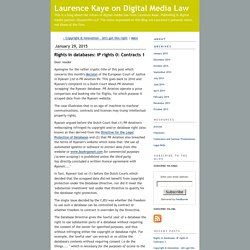
This goes back to 2010 and Ryanair's complaint to a Dutch Court about PR Aviation 'scrapping' the Ryanair database. PR Aviation operate a price comparison and booking site for flights, for which purpose it scraped data from the Ryanair website. The case illustrates that in an age of 'machine to machine' communications, contracts and licences may trump intellectual property rights. In fact, Ryanair lost on (1) before the Dutch Courts which decided that the scrapped data did not benefit from copyright protection under the Database Directive, nor did it meet the 'substantial investment' test under that Directive to qualify for the database right protection.
The Directive goes on to state that any contractual provision which overrides these 'carve outs' to copyright and database right are null and void. Have a good week. Laurie. Website operators can prohibit ‘screen scraping’ of unprotected data via terms and conditions, says EU court in Ryanair case – OUT-LAW.com. Ryanair in another victory against the screenscrapers. In the wake of its recent win against "screenscraper" website eDreams, Ryanair has claimed another victory following a referral from the Dutch Supreme Court to the Court of Justice of the EU (CJEU) on the Database Directive (96/9/EC).
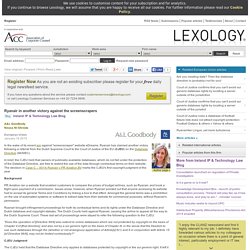
In brief, the CJEU held that owners of publically available databases, which do not fall under the protection of the Database Directive, are free to restrict the use of the data through contractual terms on their website. The decision in Case C – 30/14 Ryanair v PR Aviation BV marks the CJEU's first copyright judgment of the year. Background PR Aviation ran a website that enabled customers to compare the prices of budget airlines, such as Ryanair, and book a flight upon payment of a commission.
Issues arose, however, when Ryanair pointed out that anyone accessing its website had to accept its general Terms and Conditions by ticking a box to that effect. CJEU Judgment Screen-scraping websites may need to rethink their business models. BREAKING: CJEU says that owner of an online database not protected by copyright or sui generis right may restrict its use by contract. As Tom explained a few days ago, 2015 will be a busy copyright year at everybody's favourite court, ie the Court of Justice of the European Union (CJEU), with both a number of cases awaiting decision and new ones likely to be referred by national courts.
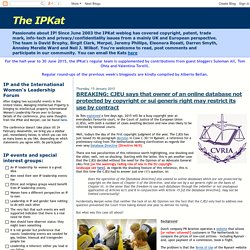
Well, today's the day of the first copyright judgment of the year. The CJEU has just issued its 46-paragraph decision in Case C-30/14 Ryanair, a reference for a preliminary ruling from The Netherlands seeking clarification as regards the ever-sexy Database Directive [Directive 96/9]. There are two peculiarities of this reference worth highlighting, one shocking and the other, well, not-so-shocking. Starting with the latter, this is yet another case that the CJEU decided without the need for the Opinion of an Advocate General (AG) first [on the seemingly fading role of AGs in the EU copyright landscape see here]. As regards the shocking feature of this reference, this is that this time the CJEU had to answer just one (1!) Background So? Barry Sookman sur Twitter : "CJEU: owner of an online database not protected by copyright or sui generis right may restrict its use by contract. L’information ne peut plus être libre (à propos d’un arrêt aberrant de la CJUE)
« Information wants to be free » : c’est l’une des phrases les plus célèbres de la culture Internet lancée par Stewart Brand lors de la première Hacker’s Conference organisée en 1984 en Californie.
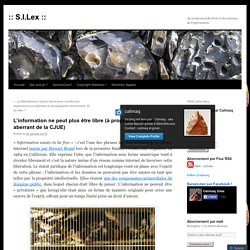
Elle exprime l’idée que l’information sous forme numérique tend à circuler librement et c’est la nature même d’un réseau comme internet de favoriser cette libération. Le statut juridique de l’information est longtemps resté en phase avec l’esprit de cette phrase : l’information et les données ne pouvaient pas être saisies en tant que telles par la propriété intellectuelle. Elles étaient une des composantes primordiales du domaine public, dans lequel chacun était libre de puiser. L’information ne pouvait être « privatisée » que lorsqu’elle était mise en forme de manière originale pour créer une oeuvre de l’esprit, offrant pour un temps limité prise au droit d’auteur. Ouvrez, ouvrez la cage aux données… (Birdcage, par Dedric Lam.
Quelles limites au droit des bases de données ? Mais elle ajoute : Top EU court: Ryanair data barrel must be left unscraped. Irish low-cost airline Ryanair can stop whomever it wishes from scraping content, according to the European Court of Justice (ECJ).
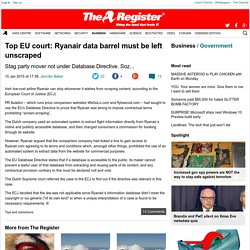
PR Aviation – which runs price comparison websites WeGoLo.com and flylowcost.com – had sought to use the EU’s Database Directive to prove that Ryanair was wrong to impose contractual terms prohibiting “screen-scraping”. The Dutch company used an automated system to extract flight information directly from Ryanair’s online and publicly accessible database, and then charged consumers a commission for booking through its website.
However, Ryanair argued that the comparison company had ticked a box to gain access to Ryanair.com agreeing to its terms and conditions which, amongst other things, prohibited the use of an automated system to extract data from the website for commercial purposes.